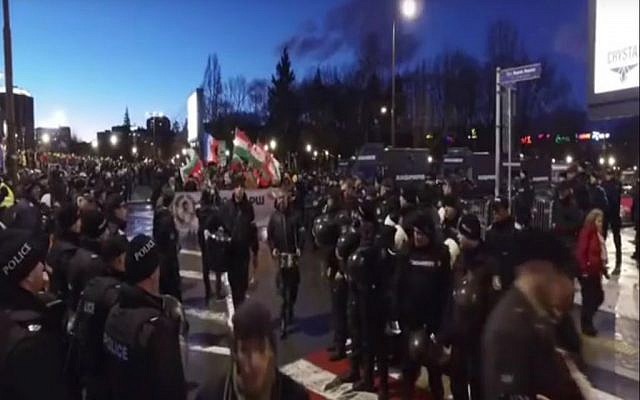Far more than 80,000 people have signed a petition to ban the so-called Lukov March in Sofia, a procession organised by Nazis in honour of Hristo Lukov, the former leader of the Union of Bulgarian National Legions. The latter organisation supported the deportation of more than 11,000 Jews to Nazi Germany’s Treblinka extermination camp.
On Thursday, January 4, 2018, at 12:30pm, a total of 83,600 people had signed the petition on the change.org platform.
Last year, and in the years before, the Lukov March was actually banned, but it took place anyway. Bulgarian police even flanked the participants in February of 2017. As always, Nazis from Bulgaria and several other European countries took part.
By now, the fact that this torch-lit parade has been taking place since 2003, in the streets of the Bulgarian capital, has led to outrage overseas. Robert Singer, the chief executive officer of the World Jewish Congress, stated in New York, the march needed to be banned. “We cannot stand by in silence as neo-Nazis and anti-Semites march through the streets of Sofia, in the same dangerous manifestation of the same anti-Semitic ideology that brought about the near destruction of European Jewry”, Singer said.
Ronald S. Lauder, the President of the World Jewish Congress, recently wrote a letter to Bulgaria’s Prime Minister Boiko Borissov, saying during Bulgaria’s Presidency of the Council of the European Union the country would be looked to for leadership. He asked Borissov “to uphold the shared values of the European Union, including those of tolerance and the rejection of extremism and anti-Semitism. In this spirit, we urge your government to be firm in preventing any and every glorification of the Nazi ideology that epitomized the darkest period of the 20th century.”
In November, the Sofia regional directorate of the Interior Ministry and Bulgaria’s National Protection Service actually told Sofia Municipality that they believed the Lukov March, planned for February 17, 2018, should be banned.
In calling for the ban, they cited the fact that the planned route involves streets and places to be used to transport delegates who will be in Sofia for events related to Bulgaria’s six-month hosting of the Presidency of the Council of the European Union.
The organisation of the Jews in Bulgaria, Shalom, is campaigning for a ban on the march as well. Several foreign embassies have already promised to support Shalom in this regard.
A recent declaration by Shalom on the matter says, Bulgaria was rightly proud of its courage in preventing the deportation of Bulgarian Jews in 1943. “At the same time, it mourns the mass-murder of the Jews from the “new territories” among the more than six million Jews who were killed in the Holocaust. In 2018, Bulgaria will be commemorating the 75th anniversary of these events. In the context of Bulgarian and of European history, permitting the Lukov March would be an abomination.”
The latest petition for a ban of the Nazi march in support of Lukov can be reached here.


























